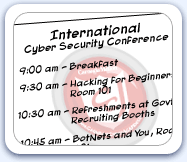Shortcuts:.
How Cyber Criminals Operate | Catching Cyber Criminals | Cyberspace's Most Wanted
Because cyber criminals can launch coordinated attacks from all over the globe, catching them often requires the collaboration of many people, and this becomes more difficult as cyber crime continues to grow. Cyber Defenders have to constantly develop new tools, new technologies, new procedures and even new fields of study just to keep up with cyber criminals.
Cyber Crime Units

Governments and law enforcement agencies have created teams of people dedicated just to tracking down cyber criminals. In the United States, the Federal Bureau of Investigation (FBI) has a special Cyber Investigations department, and they helped create the Internet Crime Complaint Center (IC3). The IC3 provides the public with an easy-to-use reporting system that alerts the authorities of suspected criminal violations.
Many police departments are training Internet or Computer Crime units that people can contact for information and assistance. These units support the law enforcement in investigating cyber crimes and tracking down cyber criminals. You can check with your local police department to see what kind of resources they have available.
Crime Unit Assistants

Since cyber crime is relatively new, there aren't a lot of experts available to train cyber defenders. Many colleges now offer degrees in fields like cyber crime and cyber forensics just to create these experts.
Software developers are also working with law enforcement by helping analyze cyber crimes and prevent attacks. They also train cyber crime units and develop and provide tools that help them collect and process evidence. One example is the COFEE (Computer Online Forensic Evidence Extractor), a USB device developed by Microsoft that allows forensics teams to quickly and easily extract data from a suspect's computer without having to confiscate it first.
Recruiting Cyber Defenders

Security conferences are a popular location for companies and government officials to try and recruit cyber defenders. At these conferences, security experts teach network administrators and information-technology managers how to protect their systems from hackers. College students can even have their tuition covered by the government, if they promise to work there after they graduate.
But some security conferences are a little more secret and underground, such as the conferences that the hackers attend. Here, budding cyber criminals and seasoned hackers meet to trade secrets and learn new tricks from each other.
Believe it or not, companies and government officials also attend these conferences, to gain more insight into the current state of cyber crime. They also try to recruit employees at these conferences, encouraging them to turn from Black Hat Hackers to Grey Hat Hackers.
Reporting Cyber Criminals

Just like any other crime, cyber criminals are going to keep getting away with committing cyber crimes if nobody ever reports them. By reporting cyber crimes you are not only helping combat cyber crime, but you are also sending a message to all cyber criminals that their behavior will not be tolerated in cyberspace.
In the United States, cyber crimes like hacking and identity theft can be reported to your local FBI office or to the Internet Crime Complaint Center Web site. For detailed information about how to report specific types of cyber crimes, visit the United States Department of Justice's cyber crime page.
If you need to report cyber bullying, to whom you and your trusted adult report it to usually depends on what the method of bullying is. Betty's Cyber Bullying page has information on reporting the different kinds of cyber bullying.
Punishment

Different countries have different laws that cover cyber crimes. So you don't underestimate the seriousness of committing cyber crimes, here's some examples of the punishments for cyber crime in the United States:
- Hacking - Hacking is covered under a Federal law addressing fraud in connection with computers. Punishments range from paying a large fine to going to jail for up to 20 years, depending on the seriousness of the crime and how much damage the hacker has done.
- Spamming - Spamming is covered under the CAN-SPAM Act and the minimum punishment is a fine of up to $11,000. Additional fines are added if the spammer violated policies or used automated bots to collect email addresses. Spammers can be sent to jail if they used false information or a computer they weren't allowed to use.
- Identity Theft - The laws covering identity theft were enhanced in 2004, requiring tougher punishments to match the seriousness of the crime. Identity thieves can go to jail for up to five years. There are also increased punishments for identity theft used to commit terrorist acts and for people who abuse their position for identity theft.
Due to the increase in cyber crimes in recent years, many governments have enhanced their cyber crime laws. However, they still need the help of cyber defenders in tracking down cyber criminals. It's important that you report cyber crimes, like spam, so that the criminals behind them can be prosecuted and fined under the law.
How Cyber Criminals Operate | Catching Cyber Criminals | Cyberspace's Most Wanted

